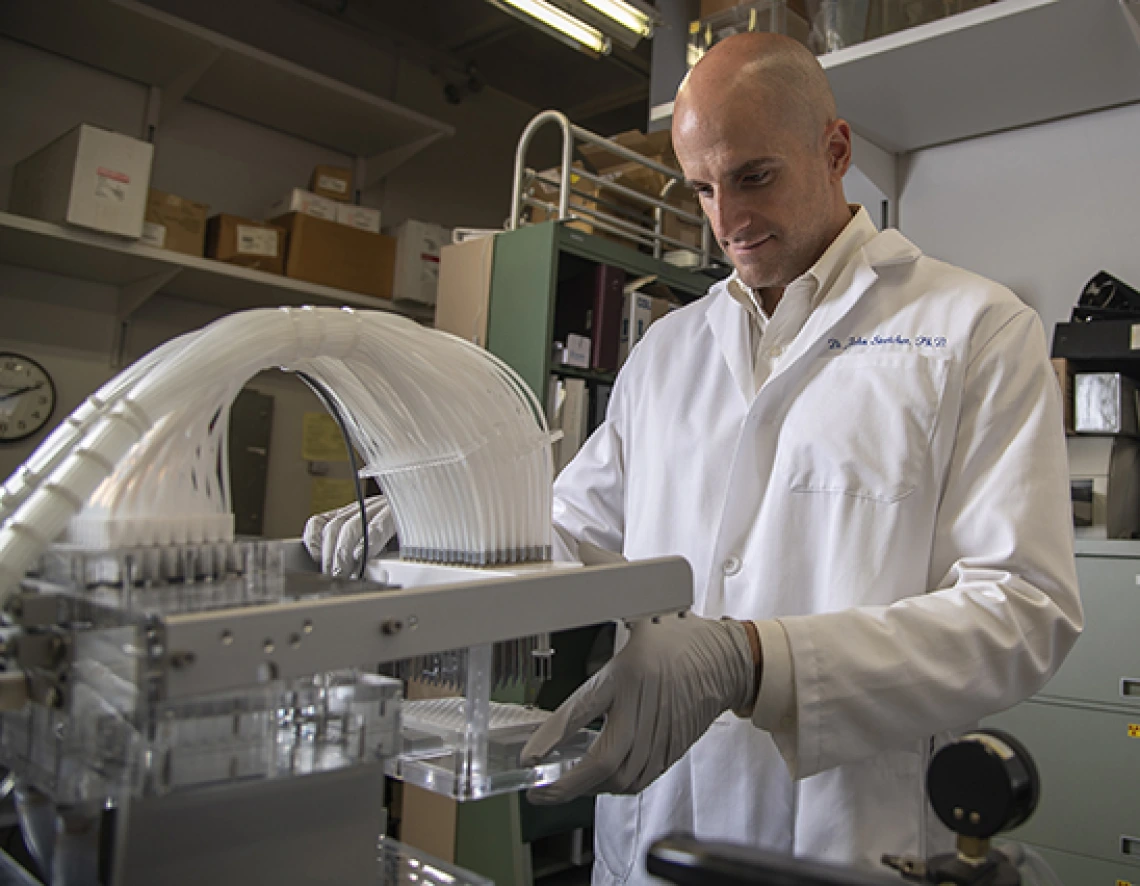UArizona health care researchers lead 2023 Flinn Seed Grants
Of the 12 awardees announced for 2023, seven are with the University of Arizona.

John Streicher
University of Arizona Health Sciences
TUCSON, AZ – The Flinn Foundation announced the awardees of its 2023 Seed Grants to Promote Translational Research, with researchers from the University of Arizona receiving seven of the 12 grants.
Each award recipient will receive a $100,000 grant over 18 months, during which time they will use the funds to de-risk innovations they are developing, refine designs, validate data, gather stakeholder feedback, and develop a plan to pursue additional funding. The goal is to advance their technologies toward readiness for the marketplace and create a positive impact for patients and healthcare professionals.
The seven University of Arizona awardees hail from the College of Medicine – Tucson, the College of Medicine – Phoenix, the UArizona Cancer Center, and the BIO5 Institute. All are working on innovative research with Tech Launch Arizona, UArizona’s commercialization arm, to develop pathways to bring their innovations from the lab to the world.
“Every year, Arizona faculty show the incredible research they are pursuing,” said Doug Hockstad, associate vice president of Tech Launch Arizona. “We are fortunate to be working with such insightful researchers and excited about the potential impact of these early-stage innovations.”
Melissa Herbst-Kralovetz, PhD
Associate Professor, College of Medicine – Phoenix; Member, UArizona Cancer Center & BIO5 Institute
Each year, about 13,000 women are diagnosed with cervical cancer, and about 4,000 die of the disease. Dr. Herbst-Kralovetz focuses her research on the early diagnosis and prevention of cervical conditions and cancers. Her work for this grant will focus on developing a diagnostic for gynecological cancer and disease along with a method of at-home test collection.
Julie Ledford, PhD
Associate Professor, College of Medicine – Tucson; Member, BIO5 Institute
Chronic obstructive pulmonary disease affects an estimated 15 million Americans with millions more undiagnosed. One person dies every 4 minutes from the disease. Using the Flinn Foundation’s grant, Dr. Ledford and her team will pursue the development of a novel therapy to treat COPD.
Guy Reed, MD
Dean and Professor, College of Medicine – Phoenix; Member, BIO5 Institute
Intracranial hemorrhage, or bleeding inside the skull, is a life-threatening condition that typically follows a head injury, and usually with a skull fracture. Dr. Reed was awarded the Flinn Foundation grant to develop a targeted therapy for intercranial hemorrhage, which can quickly lead to brain damage or death.
Travis Sawyer, PhD
Assistant Professor, James E. Wyant College of Optical Sciences; Member, BIO5 Institute
Neuroendocrine tumors, which can be benign or malignant, are rarer than many other cancers. The tumors form from cells in the nervous system that stimulate the release of hormones into the blood and can cause a wide variety of symptoms. Dr. Sawyer, whose research focuses on innovative medical imaging, will use the grant to advance technology for the localization of neuroendocrine tumors for surgical treatment.
John Streicher, PhD
Assistant Professor, College of Medicine – Tucson
More than 1 in 5 adults in the U.S. experience chronic pain. The amount of opioids prescribed and sold in the U.S. quadrupled since 1999, but the overall amount of pain reported by Americans hasn’t changed. Dr. Streicher was awarded this grant to pursue a novel approach to managing pain that eliminates the negative side effects of opioids. His research focuses on discovering how signals cascade through the nervous system and how the human body responds to opioids.
Russell Witte, PhD
Professor, College of Medicine – Tucson; Member, BIO5 Institute
Dr. Witte’s research in neurosurgery, biomedical sciences, and optical sciences focuses on devising cutting-edge imaging technology, integrating light, ultrasound and microwaves to diagnose and treat disease. He was awarded the Flinn Seed Grant to advance his research in using transcranial acoustic electric imaging – a non-invasive technique that does not require surgery – to map stimulation currents deep in the brain.
Xinglong Wang, PhD
Professor, R. Ken Coit College of Pharmacy; R. Ken and Donna Coit Endowed Chair in Aging and Neurodegenerative Disease
About 1 in 9 people over age 65 have Alzheimer’s disease, the most common cause of dementia. Dr. Wang received this grant to pursue the development of drugs to address diseases, including Alzheimer’s, that cause the degeneration of the nervous system. His work will focus on targeting a specific protein, TDP-43, which has been shown to play a role in the development of neurodegenerative diseases.
The highly competitive Flinn Foundation Seed Grant program makes annual awards to Arizona-based nonprofit organizations doing work that has a strong potential to generate positive impact for the state. The grants are designed to fund programs and initiatives that can grow into sustainable, impactful ventures.
Each application is evaluated based on factors such as potential for impact, the applying organization’s ability to follow through on the project, and the potential for the project to carry forward and provide real impact to improve patient care.

